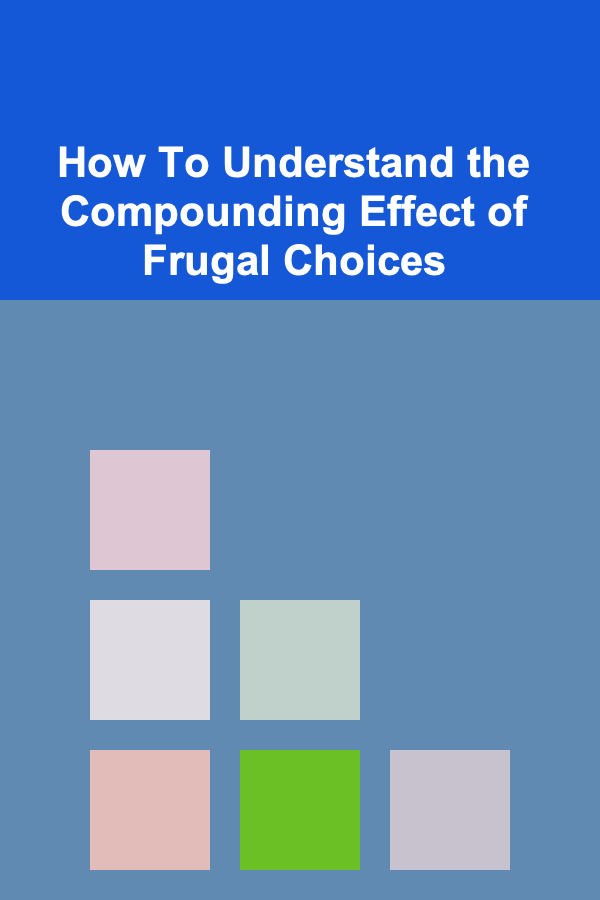
How To Understand the Compounding Effect of Frugal Choices
ebook include PDF & Audio bundle (Micro Guide)
$12.99$7.99
Limited Time Offer! Order within the next:

Frugality is often misunderstood. Many people associate it with penny-pinching or depriving oneself of enjoyment in order to save money. However, frugality, when practiced mindfully, can be a powerful tool for personal and financial growth. The concept of frugality is deeply tied to long-term thinking, delayed gratification, and, most importantly, the compounding effect. In this article, we'll explore how frugal choices, when compounded over time, lead to significant, often life-changing outcomes.
The Concept of Frugality
Frugality is the art of making intentional, conscious choices about how you spend your money, time, and energy, prioritizing long-term gains over short-term indulgences. It involves understanding the value of things, and how small sacrifices or smart spending can lead to bigger rewards down the road.
At its core, frugality is about living within your means, but it's more than just restricting your spending. It's about developing a mindset that focuses on the future and values sustainability over impulsive decisions. It requires discipline, creativity, and an understanding of how small, consistent actions add up over time.
Understanding the Compounding Effect
The compounding effect is a principle often discussed in the context of finance. It refers to the process where the value of an investment grows exponentially over time, as both the initial principal and the accumulated interest generate earnings. While this concept is most frequently applied to investments and savings, it can be equally applied to life choices, habits, and decisions, including frugality.
In essence, the compounding effect means that the more you practice frugality today, the more it will benefit you in the future. Each frugal choice you make has the potential to multiply, leading to larger financial gains, personal growth, or other long-term benefits.
Compounding in Finance
Let's begin by understanding how compounding works in finance. Imagine you invest $1,000 in a savings account or stock that offers an annual interest rate of 5%. After one year, you would have earned $50 in interest, making your total balance $1,050. However, in the second year, you earn 5% not just on your initial $1,000 but also on the $50 you earned the previous year. This results in earning $52.50 in the second year, bringing your total balance to $1,102.50.
This process continues year after year, and the growth accelerates as the interest earned gets reinvested. Over time, even small amounts of interest or savings can grow into significant sums due to this compounding effect.
Compounding in Personal Habits and Frugal Choices
Now, let's apply the concept of compounding to frugal choices. A single frugal decision, such as making coffee at home instead of buying it from a coffee shop, might save you just a few dollars each day. But over the course of a month or a year, those savings begin to compound, creating a larger impact on your finances.
For example, if you save $5 per day by brewing your own coffee instead of purchasing it, that's $35 a week. Over the course of a year, you'll have saved $1,820. If you invest that $1,820 in a savings account with an annual return of 5%, the compounding effect will start to work its magic. After one year, your savings will grow to $1,911, and in a few years, the interest on your savings will become significant.
Small Choices Add Up Over Time
Frugal choices don't always have to be big. In fact, often the most powerful compounding effects come from small, consistent decisions. These might seem insignificant at first, but when added up over time, they lead to substantial change. Let's consider some examples:
1. Eating at Home vs. Dining Out
Eating at home is one of the most common frugal choices people make. A meal at a restaurant might cost anywhere from $15 to $50 per person, depending on the location. But cooking at home can cost a fraction of that amount. If you cook just three extra meals a week at home instead of eating out, you could save $30 to $150 per week.
Over the course of a year, this could add up to a savings of $1,500 to $7,800. If you invest this money, the compounding effect can turn that savings into a significantly larger amount in the long run.
2. Choosing Public Transport Over Owning a Car
Car ownership comes with various expenses, including car payments, insurance, maintenance, fuel, and parking. While having a car provides convenience, it also drains finances over time. If you live in a city with good public transport, using it instead of owning a car can save you a substantial amount of money.
Let's say that by using public transport, you save $300 a month on car-related expenses. That's $3,600 a year. Over a few years, that could be enough to fund a small investment or emergency fund, and the money could grow with compound interest.
3. Avoiding Impulse Purchases
Impulse purchases are often small but frequent. These might be items that are on sale, something you "just have to have," or a quick trip to a store for something unnecessary. While each individual purchase might not seem like a big deal, the cumulative cost of these purchases can add up significantly.
By consciously avoiding impulse purchases, you can save hundreds or even thousands of dollars per year. If you set aside just $100 per month that you would have spent on impulse buys, you'll have $1,200 by the end of the year. If invested wisely, that money could grow through the compounding effect.
The Power of Delayed Gratification
Frugality is not only about avoiding spending---it's also about delaying gratification. This is where the real compounding effect comes into play. When you practice delayed gratification, you're making a choice to sacrifice something small now in order to gain something much larger in the future.
For instance, instead of buying an expensive item on impulse, you can save that money and invest it. Over time, that initial sacrifice will turn into a greater reward, as the money grows with compound interest. This principle also applies to other areas of life, such as education, fitness, and personal development.
Example: Saving for Retirement
One of the most common ways that frugal decisions have a compounding effect is through saving for retirement. If you start saving early, even small amounts can grow substantially over time. For example, if you save $200 per month starting at age 25, and your investment grows at an average annual rate of 7%, by the time you retire at age 65, you'll have saved over $300,000.
However, if you wait until you're 35 to start saving, you'll have to save over $400 per month to reach the same amount by age 65. The earlier you start, the less effort and money you need to put in to achieve the same financial goals. This is the power of compounding over time.
The Psychological Benefits of Frugality
While the financial benefits of frugality are well-known, there are also psychological and emotional benefits. Practicing frugality can give you a sense of control over your life and your choices. It can help reduce financial stress, as you become more confident in your ability to manage your money. It can also provide a sense of fulfillment, knowing that your efforts today are laying the foundation for a more secure and comfortable future.
Frugality often promotes mindfulness. When you consciously choose to spend less and prioritize needs over wants, you begin to develop a deeper understanding of what truly brings you happiness. Over time, this can shift your perspective, leading to greater satisfaction with less.
Conclusion: A Mindful Approach to Frugality
Frugal choices, when compounded over time, lead to incredible financial and personal growth. By understanding the power of compounding, you can make intentional decisions that yield long-term rewards, whether through savings, investments, or personal development. The compounding effect is not just about money; it's about creating a lifestyle that values the future over the present and small, consistent choices over fleeting indulgences.
Frugality doesn't mean living in deprivation---it means making choices that will serve you better in the future. The true beauty of frugality lies in its ability to multiply over time, turning small, everyday decisions into significant life changes. It's a mindset that focuses on the long-term, making it possible for you to build wealth, live sustainably, and enjoy a more fulfilling life.
By embracing the compounding effect of frugal choices, you set yourself on a path towards greater financial freedom, personal growth, and a more enriched life.

How to Create a Checklist for Managing Rejection During Your Job Search
Read More
How to Make Homemade Pet Treats for Your Furry Friends
Read More
How to Organize a Family Volunteer Day at Home
Read More
How To Practice Pranayama (Breathwork) for Calm
Read More
How To Launch Your Own Bakery from Home: A Comprehensive Guide
Read More
How to Organize Your Sticker Collection Like a Pro
Read MoreOther Products

How to Create a Checklist for Managing Rejection During Your Job Search
Read More
How to Make Homemade Pet Treats for Your Furry Friends
Read More
How to Organize a Family Volunteer Day at Home
Read More
How To Practice Pranayama (Breathwork) for Calm
Read More
How To Launch Your Own Bakery from Home: A Comprehensive Guide
Read More